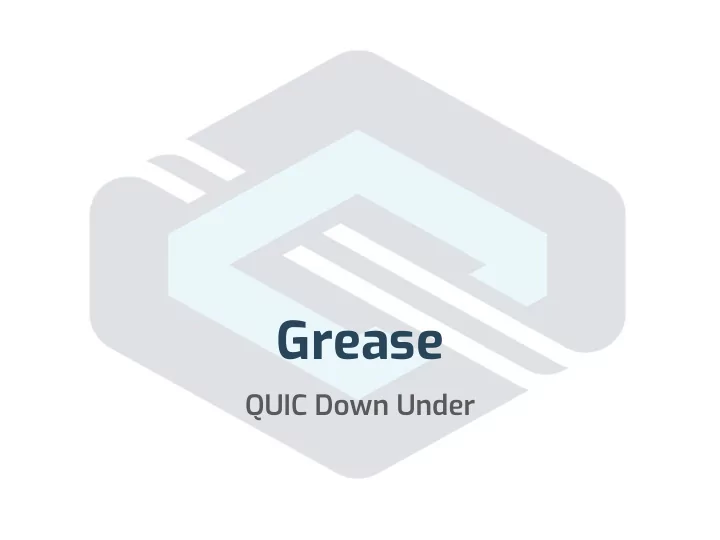

Grease QUIC Down Under
“Anything that isn’t an invariant might change” But really, what have we done to ensure that this is possible? ossification , n. The hardening or calcification of soft tissue into a bonelike material. This is what you get when you deploy a protocol and later discover that the network won’t let you change something If you don’t believe that this is a problem: https://youtu.be/_mE_JmwFi1Y 2
What can we defend? Hint: it’s grey 3
QUIC -08 status Version-specific encryption for handshake packet payload - need to know the key to get plaintext - need to know the version to get the key and cipher Some bogus versions reserved TLS can be greased (though it might not be necessary) Notable exceptions: packet numbers increase monotonically, and packet type is unencrypted 4
Why? It is important to preserve our ability to make changes at some time in the future But if something never changes in practice, then it might not be changeable in practice 5
Why? 6
Principles Change things all the time Ideal: encrypt, but this turns out to be hard Maybe: vary for every packet (hard for some things) Good enough: vary for every connection No more simple mappings of codepoint to semantic Create incentive to understand the protocol Defend against Murphy, not Machiavelli 7
#1043 - obfuscation of packet number and type Uses the modern variant of the Caesar cipher - Vigenère The secret is constant during the handshake Integrated into packet protection after handshake Key takes connection ID and endpoint role as input Packet numbers start at zero (no odd randomization) 8
Key Schedule - Old connection id expand client hs expand key Constant expand server hs expand iv expand client 0rtt expand key TLS Early Exporter expand server 0rtt expand iv expand client 1rtt [0] expand key TLS Exporter expand server 1rtt [0] expand iv expand client 1rtt [1] expand key server 1rtt [1] expand iv 9
Key Schedule - Updated connection id expand client hs expand key Constant expand iv expand server hs expand pnadd connection id expand client 0rtt expand key TLS Early Exporter expand iv expand server 0rtt expand pnadd connection id expand client 1rtt [0] expand key TLS Exporter expand iv expand server 1rtt [0] expand pnadd expand connection id client 1rtt [1] expand key expand iv server 1rtt [1] expand pnadd 10
Collateral No more funny randomization (good) ACK frames are smaller initially (good) largest_acknowledged was 8 octets ~75% of the time This uses the entire space of values for Type 0-3 STUN 16-19 ZRTP That affects multiplexing 20-63 DTLS 64-79 TURN Channel 128-191 SRTP 0-255 QUIC 64-255 QUIC w/o CID 11
This leaves the really hard stuff Connection ID - stability is all that is important, so this is OK The long/short bit - invariant, very hard Version negotiation - invariant, also very hard Packet timing and size - traffic analysis resistance is hard Monotonically increasing packet numbers - not for discussion until we resolve the spin bit issue; if we don’t do that we might use a simple PRP to strengthen this 12
Recommend
More recommend